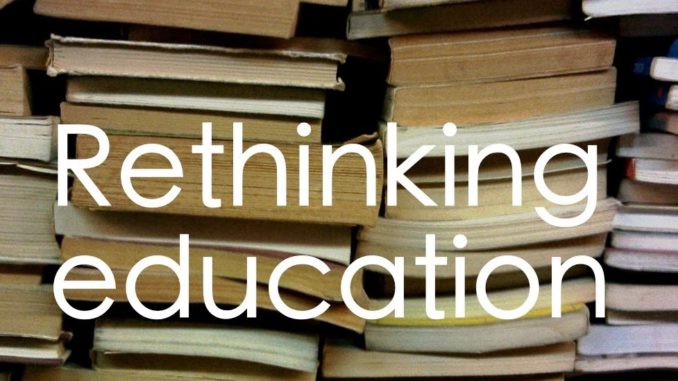
…our existing educational governmental structures aren’t cutting it in addressing innovation in education. They are too risk averse, and more often than not sideline ideas with incredible potential simply because they do not fit their expectations. Even when they do take up ideas, it is a slow process.
There is no more powerful transformative force than education – to promote human rights and dignity, to eradicate poverty and deepen sustainability, to build a better future for all, founded on equal rights and social justice, respect for cultural diversity, and international solidarity and shared responsibility, all of which are fundamental aspects of our common humanity. This is why we must think big again and re-vision education in a changing world. – Irina Bokova, Director-General of UNESCO
The world as we know it has rapidly changed and is doing so at a speed that has never been seen or imagined before. The skills requirements for the future have totally new proportions, and global learning systems must adjust quickly to prepare our children for this difference.
Last week we had well over 50 children at the STEM bootcamp of our social enterprise. We had application projects to goad mastery of key STEM concepts such as Measurement-Area and Perimeter. We were saddened to discover that a lot of our children were unable to connect what they had learnt to solving the simulated investigation activity. It led to us having major reflection time to rethink education, the stakeholders and the foundational concepts. It brought us back to significant questions.
Precisely What Is Education?
We live in an age where information is readily available at all our fingertips; we all have access to a level of technical knowledge that wasn’t conceivable 20 years ago. We must learn to distinguish between information and knowledge. Subjects alone, such as mathematics, science, languages – while the core foundation of learning – aren’t the only reason one gets an education.
Education In All Stages Must Yield the Six “C”s
● Critical/Analytical Thinkers: Due the fact that more and more information is available at the click of a button, the ability to take apart, associate dissimilar areas, and relate technical information to complicated problems is even more important.
foraminifera
● Creative Thinkers: In an age of nonstop copying and plagiarism, originality and creativity have become progressively unusual. It is crucial for educators to cultivate creativity, uniqueness and the creation of new knowledge.
Spending money to “fix the old structures”, instead of creating new paradigm shifts that could solve problems and lay the groundwork for the transformation to future-readiness.
● Collaborators: Complicated problems need multidisciplinary, cross sectoral thinking and collaborative working approaches. Teaching and learning styles must modify to infuse this as early as possible.
● Continuous Learners: The future of work requires practical and technical skills with an emphasis on work/life balance. We also have a rapidly aging workforce that lacks these skills and they are living longer, which means that learning has to be a lifelong process.
● Citizens of the World: The planet is completely intertwined and will require global citizens who understand the “big picture” and restructure governance structures as borders collapse and physical resources are gradually more scarce.
● Compassion: The amount of violence in the world currently reflects the absolute need for compassion and peace to be embedded into all learning.
The Crux of the Matter: Are Our Schools Equipped To Deliver?
From the experience we have garnered with working with schools, our existing educational governmental structures aren’t cutting it in addressing innovation in education. They are too risk averse, and more often than not sideline ideas with incredible potential simply because they do not fit their expectations. Even when they do take up ideas, it is a slow process.
Unfortunately, this cycle seems to perpetuate itself to the detriment of the children. Spending money to “fix the old structures”, instead of creating new paradigm shifts that could solve problems and lay the groundwork for the transformation to future-readiness.
Adetola Salau, Carismalife4U@gmail.com, an advocate of STEM education, public speaker, author, and social entrepreneur, is passionate about education reform.
END

Be the first to comment